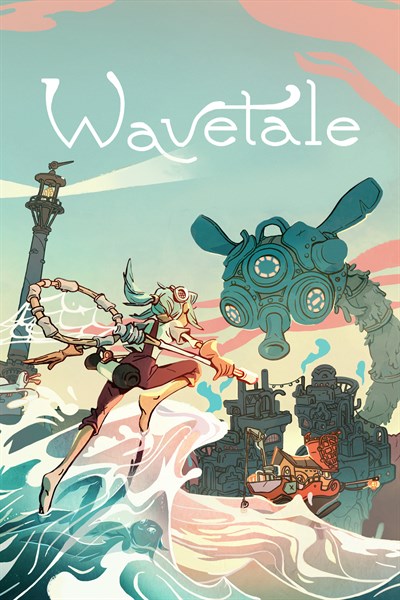Combining Trauma with Feelgood — The Story of Wavetale
“Happy lyrics should always be paired with a minor key, and vice versa!” – a guest teacher at my music school once proclaimed this with certainty, arguing that you needed that touch of melancholy to make things interesting.
Now, writing a video game script might not be the same as writing a hit song, but those words still come back to me from time to time, and definitely popped up while I was working on Wavetale. Because while it might not be a universal truth, combining the lighthearted and the heavy can create something special. More importantly, it helps us create something relatable.
I remember when my close friend’s dad died. It was sudden and unexpected, and he had to wait until the next day to take the train up north to the rest of his family. I kept him company for the night and we spent the evening altering between crying and remembering his dad, and laughing at overly intense knife infomercials on TV. Humans have always used humor to cope, and it felt natural for us to go down that route with Wavetale, too.

At its core, Wavetale deals with some weighty topics: the loss of a daughter and mother, a grandma who buries her grief with work, and a sunken city dealing with the aftermath of war. And amidst all this is Sigrid, a lonely teenage girl who has never known any other life than this—until an old enemy returns and changes everything. But rather than keeping a tight grip on the dark aspects of Sigrid’s experience, we often chose to put them on the sidelines in favor of Grandma making a pun about bananas or Sigrid remembering the time she kept an eel for a pet. Their fears and sorrows always exist in the periphery, but only rarely does it take over entirely.
There were different reasons to go down this path, one of them being gameplay. Wavetale is about movement. A lot of the dialogue in the game takes place as you surf the waves of Strandville, and a complicated conversation about your part in a war of the past just doesn’t come into its own when the player is happily flinging themselves into the air or making a daring dive below the water’s surface. We needed to find ways to convey these feelings and stories without them clashing with the player’s actions.

But even outside the more technical reasons, I also find this method to be a helpful tool for making heavy topics approachable. We really wanted to tell a story that felt hopeful. Wavetale was created mostly during a raging pandemic, and maybe our own need for warmth and optimism influenced the work we did. A crisis can drive people apart, but also bring us together in unexpected ways, just like when Sigrid realizes that… well, I leave it to you to play the game and see how things pan out.

Wavetale
Thunderful
New Class, More Content, All Black Desert
Designing We Are The Caretakers, Available Now on Xbox
Shieldmaiden Is Available Now for Xbox One and Xbox Series X|S
source https://news.xbox.com/en-us/2023/01/09/combining-trauma-with-feelgood-the-story-of-wavetale/

Post a Comment for "Combining Trauma with Feelgood — The Story of Wavetale"